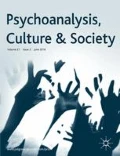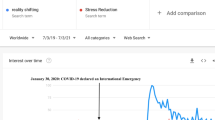Abstract
The demand for narrative coherence within a nonnegotiable normative frame may enact a form of what Judith Butler calls ethical violence. Through an interpretive analysis of archival data from O’Loughlin, Arac-Orhun and Queler’s research with psychosocial clubhouse members, I argue that this ethical violence can be countered through recognition of the unsymbolizable elements of personhood that elude conscious narration. Drawing from Lacan, Bion, and Butler, I argue that by risking our exposure to the opacity of the psychiatric sufferer’s subjectivity, we may avoid objectifying patients and reifying the unsymbolizable psychic violence encoded in severe forms of psychiatric distress.
Similar content being viewed by others
Notes
The term “psychosis” is commonly used to signify “serious mental illness,” thereby situating psychosis in a medicalized diagnostic framework. Although I dispute medicalized categorizations of psychiatric suffering in this paper, I use the term psychosis to refer to phenomena in which a person’s status as subject is threatened with dissolution. Framing psychosis this way displaces it from the narrow field of individual psychopathology, highlights the links between trauma and psychiatric distress, and emphasizes our ethical responsibility in the clinical encounter.
References
Abraham, N., & Torok, M. (1994). The shell and the kernel: Renewals of psychoanalysis (N. T. Rand, Ed. & Trans.). University of Chicago Press. (Originally work published 1987)
Agamben, G. (1998) Homo sacer: Sovereign power and bare life (D. Heller-Roazen, Trans.). Stanford University Press. (Original work published 1995)
Ben-Moshe, L., Chapman, C., & Carey, A. (Eds). (2014). Disability incarcerated: Imprisonment and disability in US and Canada. Palgrave Macmillan.
Bion, W. R. (1984). Learning from experience. Karnac. (Original work published 1962)
Bion, W. R. (1987). Second thoughts: Selected papers on psycho-analysis. Karnac. (Original work published 1967)
Bion, W. R. (2018). Negative capability. In C. Mawson (Ed.), Three papers of W. R. Bion (pp. 19–28). Routledge. (Original work published in 1967)
Butler, J. (2005). Giving an account of oneself. Fordham University Press.
Cantin, L. (2002). From delusion to dream. In: R. Hughes, & K. R. Malone (Eds.), After Lacan: Clinical practice and the subject of the unconscious (pp. 87–102). State University of New York Press.
Dalal, F. (2018). CBT: The cognitive behavioural tsunami: Managerialism, politics and the corruptions of science. Routledge.
Davoine, F. (2012). The psychotherapy of psychosis and trauma: A relentless battle against objectification. Psychoanalysis, Culture & Society 17, 339–347.
Davoine, F., & Gaudillière, J.-M. (2004). History beyond trauma: Whereof one cannot speak, thereof one cannot stay silent (S. Fairfield, Trans.). Other Press.
Deegan, P. E. (1997). Recovery and empowerment for people with psychiatric disabilities. Social Work in Health Care, 25(3), 11–24.
Doyle, A., Lanoil, J., & Dudek, K. (2013). Fountain House: Creating community in mental health practice. Columbia University Press.
Friedson, M. L. (2019). Necrophilic tendencies in schizophrenia treatment: Destroying our humanity one behavioral plan at a time. Fromm Forum, 23 (English Edition, ISSN 1437-1189).
Friesen, P. (2017). A place for subjectivity in psychiatry. AJOB Neuroscience, 8(2), 116–117.
Fromm, E. (1955). The sane society. Routledge.
Gaudillière, J. M. (2021). Madness and the social link: The Jean-Max Gaudillière seminars 1985–2000 (A. Jacob, Trans.). Routledge.
Hook, D. (2017). Six moments in Lacan: Communication and identification in psychology and psychoanalysis. Routledge.
Hunter, N. (2018). Trauma and madness in mental health services. Palgrave Macmillan.
Kilian, R., Lindenbach, I., Löbig, U., Uhle, M., Petscheleit, A., & Angermeyer, M. C. (2003). Indicators of empowerment and disempowerment in the subjective evaluation of the psychiatric treatment process by persons with severe and persistent mental illness: A qualitative and quantitative analysis. Social Science & Medicine, 57(6), 1127–1142.
Kirmayer, L. J., Corin, E., & Jarvis, G. E. (2004). Inside knowledge: cultural constructions of insight in psychosis. In X. F. Amador, & A. S. David (Eds.), Insight and psychosis: Awareness of illness in schizophrenia and related disorders (pp. 197–230). Oxford University Press.
Lacan, J. (1996). Presentation of the memoirs of President Schreber in French translation (A. J. Lewis, Trans.). Analysis, 7, 1-4. (Original work published in 1966)
Lacan, J. (1993). The psychoses: The seminar of Jacques Lacan, book III (R. Grigg, Trans.). W. W. Norton. (Original work published in 1981)
Leader, D. (2011). What is madness? Penguin.
Moncrieff, J. (2008). The myth of the chemical cure. Palgrave Macmillan.
Moncrieff, J. (2013). The bitterest pills: The troubling story of antipsychotic drugs. Springer.
Nyttingnes, O., Ruud, T., & Rugkåsa, J. (2016). ‘It’s unbelievably humiliating’—Patients’ expressions of negative effects of coercion in mental health care. International Journal of Law and Psychiatry, 49, 147–153.
O’Loughlin, M. (2020). Ethical loneliness in the psychiatric clinic: The manufacture of non-belonging. Ethics, Medicine and Public Health, 14. https://doi.org/10.1016/j.jemep.2020.100518
O’Loughlin, M., Charles, M., Crosby, J., Arac-Orhun, S., & Queler, M. (2014). Closing the gap: Narrating the prose of severe psychic suffering. Psychoanalysis, Culture, & Society, 19, 98–106.
O’Loughlin, M., Arac-Orhun, S., & Queler, M. (Eds.). (2019). Lives interrupted: Psychiatric narratives of struggle and resilience. Lexington Books.
Queler, M. & O’Loughlin, M. (2019). Dylan: Escape artist. In M. O’Loughlin, S. Arac-Orhun, & M. Queler (Eds.), Lives interrupted: Psychiatric narratives of struggle and resilience (pp. 91–110). Lexington Books.
Rogers, A. (2007). The unsayable: The hidden language of trauma. Ballantine.
Rogers, A. (2016). Incandescent alphabets: Psychosis and the enigma of language. Karnac.
Teo, T. (2009). Philosophical concerns of critical psychology. In D. Fox, I. Prilleltensky, & S. Austin (Eds.), Critical psychology: An introduction (2nd ed., pp. 36–53). Sage.
Vanheule, S. (2011). The subject of psychosis: A Lacanian perspective. Palgrave Macmillan.
Whitaker, R. (2010). Anatomy of an epidemic: Magic bullets, psychiatric drugs, and the astonishing rise of mental illness in America. Random House.
Acknowledgments
I thank Michael O’Loughlin, Secil Arac-Orhun, and Montana Queler for their integrity and respectfulness in conducting the fieldwork upon which this paper is based. I also thank “Dylan,” the participant whose interviews inspired this paper, for the gift of allowing us to listen.
Conflict of interest
The corresponding author states that there is no conflict of interest.
Author information
Authors and Affiliations
Corresponding author
Additional information
Publisher's Note
Springer Nature remains neutral with regard to jurisdictional claims in published maps and institutional affiliations.
Rights and permissions
Springer Nature or its licensor (e.g. a society or other partner) holds exclusive rights to this article under a publishing agreement with the author(s) or other rightsholder(s); author self-archiving of the accepted manuscript version of this article is solely governed by the terms of such publishing agreement and applicable law.
About this article
Cite this article
Cohen, E. Recognition beyond normativity: Ethically-attuned listening with the subject of psychosis. Psychoanal Cult Soc 28, 179–196 (2023). https://doi.org/10.1057/s41282-022-00338-5
Published:
Issue Date:
DOI: https://doi.org/10.1057/s41282-022-00338-5




